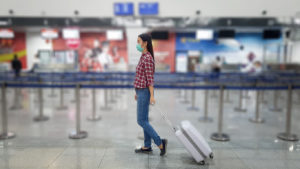South Korean Baptists minister in midst of pandemic
As the global COVID-19 pandemic continues, Baptists in South Korea—one of the most-affected nations in the early days of the outbreak—have found ways to minister to their neighbors and adjust to restrictions.
“Some Baptist churches are volunteering to help medical staff and government officials and others fighting against outbreak,” Timothy Hyunmo Lee, professor of missions at Korea Baptist Theological Seminary in Daejeon, South Korea, reported in a March 12 email. “Because of the lack of masks, the members of the churches are making masks at home and providing them where they need them.”
Some South Korean churches with retreat centers offered them as infirmaries for patients with mild symptoms, he added.
After the novel coronavirus spread beyond China, South Korea was one of the first nations to experience a severe outbreak, with about 7,800 confirmed cases.
“However, the infection rate in Korea seems to have slowed gradually in recent days, and the situation seems to be beginning to stabilize,” Lee reported. The number of new confirmed cases per day, which had peaked at more than 800, had dropped to about 200, he added.
Avoiding ‘cluster infection’
Baptist churches adapted to the spread of the virus in different ways, he noted.
“Many churches are turning Sunday regular services into online services, forcing people to worship without gathering, because they are concerned about cluster infection in church buildings,” he wrote. “There are some churches that continue to have regular service on Sundays, but they also have stopped all programs except Sunday worship.”
Lee had contacted the general secretary of the Korea Baptist Convention to ask the degree to which members of Baptist churches had been affected directly by the COVID-19 outbreak.
“There is no definitive statistic of how many Baptists are among the confirmed cases. Fortunately, there is no Baptist church suffering infection cluster,” Lee wrote.
 However, about 60 percent of the COVID-19 cases in the nation have been tied to the secretive Shin-cheon-ji Church, which Lee said mainstream Christian groups describe as a heretical sect.
However, about 60 percent of the COVID-19 cases in the nation have been tied to the secretive Shin-cheon-ji Church, which Lee said mainstream Christian groups describe as a heretical sect.
“In this case, the outbreak began at Shin-cheon-ji meetings in Daegu, but they were reluctant to provide information of meeting attendants to the government, hiding or falsely reporting. It resulted in the failure of preventing the initial spread,” he asserted.
“In Korea, religious freedom is considered sacred, and the use of force and power to religious organizations was absolutely prohibited. So, the government waited for this group voluntarily to cooperate. It became a major factor resulting in the huge outbreak,” Lee wrote.
“Within the last two weeks, the government had mobilized police forces to check the list and information of Shin-cheon-ji members and forced them to be self-quarantined. However, it was already spread too much. In a country that emphasizes religious freedom highly, it is under attack.”
Lee asked for prayers not only for the outbreak of the disease to stop, but also that Christian evangelistic work in his country would not be harmed.
Elijah Brown, general secretary of the Baptist World Alliance, also issued a call for Baptists globally to recognize the pandemic as an opportunity “to pray and serve.”
“In the most impacted areas, churches have been temporarily closed and families face uncertainty,” Brown said. “Would you continue to pray for all who have been impacted and that Baptists around the world will be at the forefront of gracefully serving communities that are struggling?”